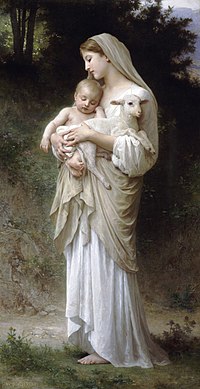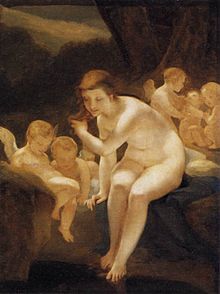Is It Possible to Become Innocent Again


Innocence is a lack of guilt, with respect to any kind of crime, or wrongdoing. In a legal context, innocence is to the lack of legal guilt of an individual, with respect to a crime. In other contexts, it is a lack of experience.
In relation to cognition [edit]
Innocence tin can imply bottom feel in either a relative view to social peers, or by an absolute comparing to a more common normative scale. In contrast to ignorance, it is by and large viewed equally a positive term, connoting an optimistic view of the world, in particular one where the lack of knowledge stems from a lack of wrongdoing, whereas greater knowledge comes from doing wrong. Subjects such as criminal offence and sexuality may be especially considered. This connotation may be connected with a popular imitation etymology explaining "innocent" as pregnant "not knowing" (Latin noscere (To know, learn)). The actual etymology is from general negation prefix in- and the Latin nocere, "to impairment".
People who lack the mental capacity to understand the nature of their acts may be regarded every bit innocent regardless of their beliefs. From this meaning comes the usage of innocent every bit a substantive to refer to a kid under the historic period of reason, or a person, of any age, who is severely mentally disabled.
Nonetheless, the word "innocence" is used to describe babyhood innocence equally a notion created and controlled by adults. As Jean-Jacques Rousseau describes 'babyhood as a time of innocence' where children are 'not-knowing' and must reach the historic period of reason to become competent people in club. However, this is not the case anymore every bit technology advances, this has given children in the contemporary globe a platform where they are referred to as 'digital natives', where they appear to be more knowledgeable in some areas than adults.[1]
Pejorative meaning [edit]
In some cases, the term "innocence" has a pejorative pregnant, where an causeless level of experience dictates common discourse or baseline qualifications for entry into another, dissimilar, social feel. Since experience is a prime factor in determining a person's point of view, innocence is often also used to imply naivety or lack of personal experience.
Symbolism [edit]

Faience plate, Bordeaux, c. 1840, "A shadow which will later become realized".
The lamb is a normally used symbol of innocence'southward nature. In Christianity, for example, Jesus is referred to as the "Lamb of God", thus emphasizing his sinless nature.[two] Other symbols of innocence include children, virgins, acacia branches (especially in Freemasonry),[3] non-sexual nudity, songbirds and the colour white (biblical paintings and Hollywood films depict Jesus wearing a white tunic).[four]
Loss of innocence [edit]
A "loss of innocence" is a common theme in fiction, popular culture, and realism. Information technology is oftentimes seen as an integral part of coming of age. It is commonly thought of as an feel or period in a person's life that leads to a greater sensation of evil, hurting and/or suffering in the world around them. Examples of this theme include songs like "American Pie",[5] poesy similar William Blake's drove Songs of Innocence and of Experience, novels similar To Impale a Mockingbird, The Catcher in the Rye, A Farewell to Arms, and Lord of the Flies, and films like Viridiana, The 400 Blows, and Stand By Me.
By contrast, the I Ching urges a recovery of innocence - the name given to Hexagram 25 - and "encourages you to actively do innocence".[6]
Innocence could also be viewed as a Westernized view of childhood, and the "loss" of innocence is just a social construction or viewed every bit the dominant ideology. Thinkers such every bit Jean-Jaques Rousseau used the romanticism discourse as a manner to carve up children from adults. Ideas surrounding childhood and childhood innocence stems from this discourse.
In psychoanalysis [edit]
The psychoanalytic tradition is broadly divided between those (like Fairbairn and Winnicott) who saw the child as initially innocent, but liable to lose its innocence nether the affect of stress or psychological trauma; and those (similar Freud and Klein) who see the child as developing innocence - maturing into it - as a result of surmounting the Oedipus complex and/or the depressive position.[7]
More than eclectically, Eric Berne saw the Child ego country, and its vocabulary, every bit reflecting three different possibilities: the cliches of conformity; the obscenities of revolt; and "the sweet phrases of charming innocence".[8] In a rather unlike conception, Christopher Bollas used the term 'Violent Innocence' to describe a fixed and obdurate refusal to admit the existence of an culling viewpoint[ix] - something alike to what he calls "the fascist construction, the event is to empty the heed of all opposition".[10]
Literary sidelights [edit]
- In The Aureate Notebook, a adult female looks dorsum in laughing envy at the innocence that had previously allowed her to submerge herself in the position of the 'woman-in-love'.[11]
- Ivy Compton-Burnett had ane grapheme conclude dourly of another two that "y'all are both of you innocent though it is an innocence rooted in your wishes for your own lives".[12]
See too [edit]
- Beginner's mind
- Ingénue
- Three wise monkeys
- Naivety
- Gullibility
- Fig foliage covering
References [edit]
- ^ Boyd, Danah, 1977-. It'southward Complicated: the Social Lives of Networked Teens. New Haven: Yale University Printing, 2014. Impress.
- ^ Freemasonry: Its Symbolism, Religious Nature, and Law of Perfection (March ten, 2003). By Chalmers I. Paton (author). ISBN978-0766142015.
- ^ The Numismatist (1903). By American Numismatic Association. 1903. Retrieved February 25, 2013.
- ^ The Encyclopedia Americana: A Library of Universal Cognition (1920). Past Encyclopedia Americana Corporation. 1920. Retrieved Feb 25, 2013.
- ^ Levitt, Saul. "Interpretation of American Pie - assay, news, Don McLean, Buddy Holly, Ritchie Valens, Stone & Roll". Missamericanpie.co.uk. Retrieved 2011-02-16 .
- ^ B. B. Walker trans, The I Ching or Book of Changes (1993) p. 53
- ^ North. Symington, Narcissism (1993) p. xiv-15
- ^ Eastward. Berne, What Do You Say After Y'all Say Hello? (1974) p. 325
- ^ S. Cavanagh, Skin, Culture and Psychoanalysis (2013) p. 137
- ^ Quoted in Adam Phillips, On Flirtation (1994) p. 158
- ^ Doris Lessing, The Gilt Notebook (1973) p. 216
- ^ I. Compton-Burnett, The Last and the First (1971) p. 142
Source: https://en.wikipedia.org/wiki/Innocence
0 Response to "Is It Possible to Become Innocent Again"
Post a Comment